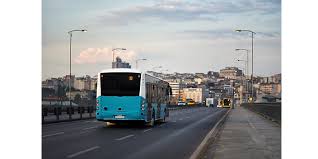At TEMS Tech Solutions (TTS), our Public Transport Optimization service empowers city planners, transport authorities, and public transit operators to improve the efficiency, accessibility, and sustainability of public transportation systems. Using data analytics, AI, and machine learning, we help optimize routes, reduce congestion, enhance passenger experience, and improve overall operational performance, ensuring that public transport systems are reliable, cost-effective, and user-friendly.
Key features include:
-
Route Optimization: Analyze real-time and historical data to optimize public transport routes, reducing travel times, minimizing congestion, and improving efficiency for both passengers and operators.
-
Demand Forecasting: Use predictive analytics to forecast passenger demand across different times, days, and locations, enabling more effective planning of services and resource allocation.
-
Fleet Management: Optimize the use of buses, trains, and other vehicles by analyzing vehicle usage patterns, maintenance schedules, and capacity, ensuring that fleets operate efficiently and are well-maintained.
-
Passenger Flow Analysis: Monitor passenger flow at key transport hubs and stations to identify bottlenecks, adjust schedules, and reduce overcrowding during peak hours.
-
Real-Time Traffic and Incident Monitoring: Leverage real-time data to monitor traffic conditions, incidents, and delays, allowing for dynamic route adjustments and improved punctuality.
-
Energy Consumption and Sustainability: Track energy usage and emissions from public transport vehicles to identify areas for improvement, helping cities move towards greener, more sustainable transit solutions.
-
Fare Optimization and Revenue Management: Analyze fare structures and payment data to optimize pricing strategies, ensuring affordability for passengers while maximizing revenue for transit authorities.
-
Predictive Maintenance: Use data from vehicles and transport infrastructure to predict when maintenance is needed, reducing downtime, preventing breakdowns, and ensuring reliable service.
-
Passenger Satisfaction and Feedback Analysis: Collect and analyze passenger feedback and satisfaction data to improve service quality, address complaints, and ensure a positive user experience.
-
Multimodal Transport Integration: Analyze data from various modes of transport (buses, trains, bicycles, etc.) to ensure seamless integration and improve the overall travel experience for passengers.
-
Crowd Management: Implement crowd management strategies by analyzing real-time passenger data, helping transport authorities adjust capacity and schedules to manage large crowds during events or peak travel times.
-
Smart Ticketing and Digital Payments: Analyze ticketing and payment data to improve the efficiency and security of digital payment systems, making public transport more convenient and accessible for users.
-
Public Transport Accessibility: Ensure equitable access to public transport services by analyzing usage patterns and geographic data, enabling targeted improvements in underserved areas.
-
Cost Reduction and Efficiency: Identify cost-saving opportunities in operations, maintenance, and fuel consumption, ensuring that public transport systems run efficiently and within budget.
-
Traffic Congestion Reduction: Analyze the relationship between public transport and road traffic, enabling better coordination and reducing congestion in urban areas.
-
Safety and Security Monitoring: Use data analytics to monitor safety incidents, accidents, and security threats, enabling transit authorities to take proactive measures to enhance passenger safety.
-
Passenger Behavior Insights: Gain insights into passenger behavior, such as travel frequency, preferred routes, and peak usage times, allowing for personalized service enhancements.
-
Timetable and Scheduling Optimization: Optimize public transport timetables and schedules based on passenger demand and real-time data, ensuring that services are reliable and meet the needs of commuters.
-
Infrastructure Investment Planning: Analyze the current and future needs of transport infrastructure to guide investment decisions, ensuring that public funds are used effectively to expand and improve services.
-
Accessibility for Disabled and Elderly Passengers: Use analytics to identify and address barriers faced by disabled and elderly passengers, ensuring that public transport is inclusive and accessible to all.
-
Data-Driven Policy Making: Provide city planners and transport authorities with actionable insights to support data-driven decisions, helping to shape policies that improve public transport systems.
-
Environmental Impact Analysis: Monitor and analyze the environmental impact of public transport operations, helping cities adopt more sustainable practices and reduce carbon footprints.
-
Dynamic Pricing Models: Implement dynamic pricing models using data analytics to adjust fares based on demand, optimizing revenue while balancing affordability for passengers.
-
Service Performance Benchmarking: Compare the performance of public transport services against industry standards and peer cities to identify areas for improvement and ensure competitive service delivery.






Reviews
There are no reviews yet.